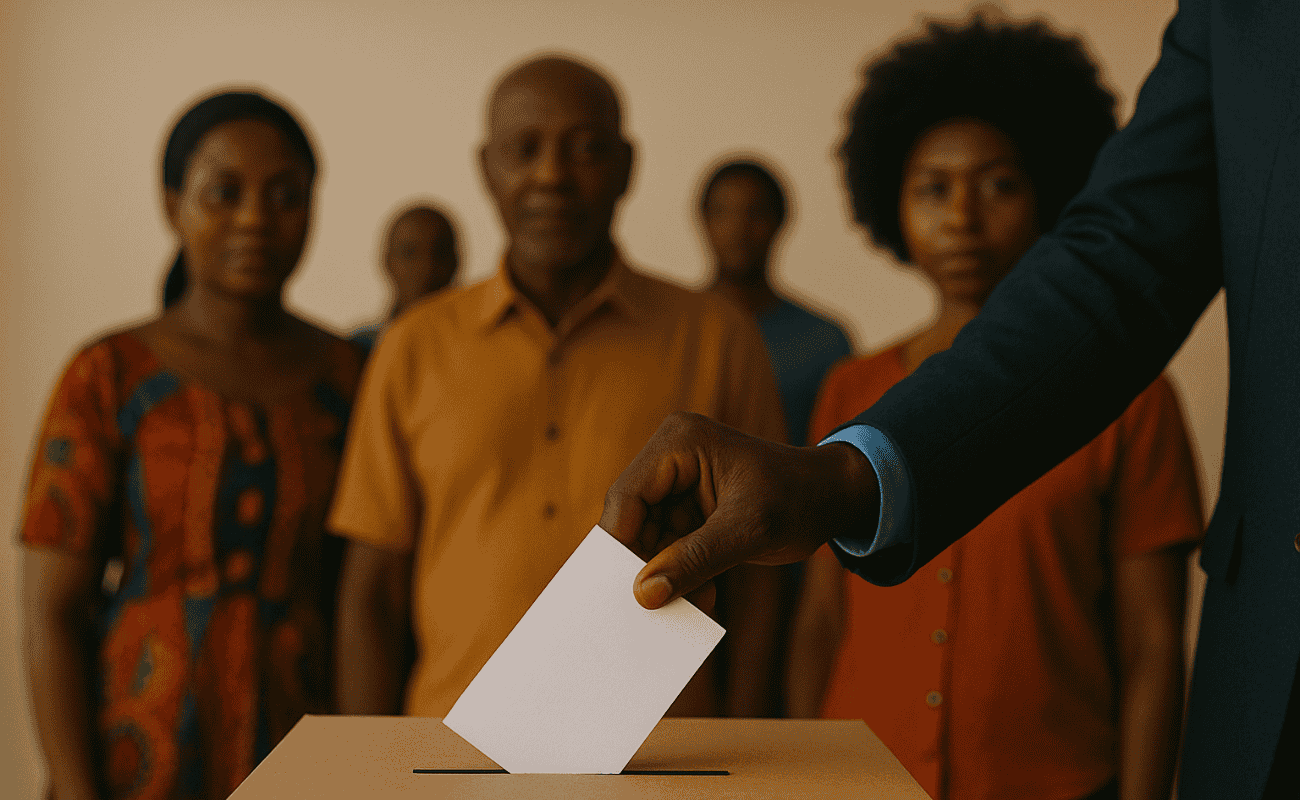
By Praise Laoye
Right from when we are young, we are told that democracy is the voice of the people. We are told that the ballot box holds the power to shape our future. We were taught that each vote is vital, that every citizen’s vote counts. But somewhere between all that, the belief began to fade.
Although no country in the world can proudly claim to have achieved a perfectly free and fair election, in Africa, the cracks run deeper. Here, democracy often wears borrowed clothes dressed up in promises it never intends to keep. The rituals of voting remain, but each election season feels less like a moment of choice and more like a pre-ordained event, where power passes hands in a dance already choreographed behind closed doors.
Across the continent, the numbers tell the story. Data shows that barely 44 percent of post-coup elections in sub-Saharan Africa could be described as credible. The rest were packed with abnormalities ranging from, vote manipulation, intimidation, or outright rigging. In Nigeria, one of Africa’s largest democracies, 22 percent of voters admitted they were offered money or food in exchange for their votes during the 2023 general elections up from 17 percent just four years earlier. Civil groups also recorded dozens of cases of ballot-box hijacking and vote-buying across multiple states.
In Kenya, more than half of surveyed voters confessed to having received a bribe at some point during an election, and nearly a quarter admitted to offering one. Ghana’s story is different in form but not in feeling: only about a third of its citizens say they trust the Electoral Commission, and less than 40 percent believe their elections are truly free and fair.
The wider picture is grim Across Africa, citizen confidence in electoral commissions has plunged from about 51 percent to just 41 percent in a decade. That distrust eats at democracy’s core. When people no longer trust the referee, they stop believing in the game.
With the present and rising generation, the level of political apathy is alarming. Many young Africans have grown tired of empty promises and recycled leaders. They see politics not as a tool for progress but as a stage for corruption and deceit. For them, elections are no longer moments of hope they are reminders of betrayal.
. Across the continent, the trend is the same: rising education and connectivity have not translated into stronger faith in democracy. Instead, there is anger, irony, and a sense that the ballot box no longer speaks their language.
Another common view among the youth is simple but heavy: why vote when it doesn’t count?
It’s a question borne not out of ignorance, but of experience. They’ve seen elections decided by courts, not ballots. They’ve watched votes disappear between polling units and collation centers. They’ve heard promises dissolve the morning after victory speeches. So, many have stopped believing their thumbprint carries any power at all.
In countries like Nigeria, Kenya, and Zimbabwe, every election cycle ends with the same tired headlines, “irregularities,” “logistical failures,” “allegations of rigging.” The pattern breeds pessimism. To young voters, it begins to look like the game is fixed, the referee is bought, and the scoreboard is rigged before kickoff.
Still, even in their disappointment, the youth have not gone mute, they’ve only changed their stage. The ballot box may have lost its meaning, but the screen has taken its place. Social media is now their parliament, their protest ground, their court of public opinion.
Here, politics isn’t bound by ballot papers or polling stations. It happens in real time in tweets, live streams, and viral threads. The young no longer wait for election day to be heard; they create their own platforms, their own narratives. Hashtags have become political parties without leaders, movements without manifestos.
From #EndSARS in Nigeria to #FeesMustFall in South Africa, and #CongoIsBleeding across the continent, the youth have turned their frustration into digital firepower. They expose lies, demand justice, and force conversations that the state would rather silence. For them, the internet isn’t just a tool, it’s a weapon, a refuge, a revolution.
This is what modern political participation looks like, not queues at polling units, but timelines ablaze with dissent. The youth may doubt the ballot, but they have mastered the algorithm and, in that mastery, they are slowly reshaping the meaning of power itself.
But even this last refuge is shrinking. Recently, the Tanzanian government banned access to X, the platform once known as Twitter claiming it spreads “misinformation.” What this really shows is fear: fear of a generation that no longer bows to silence, fear of voices that organize faster than power can contain. With that ban, even the one passage left for the youth to speak, connect, and resist is being regulated.
And so, the circle tightens. When the vote no longer counts and the voice is cut off, what remains? The youth once the pulse of democracy is being pushed to a wall, their hope slowly replaced by quiet rage.
